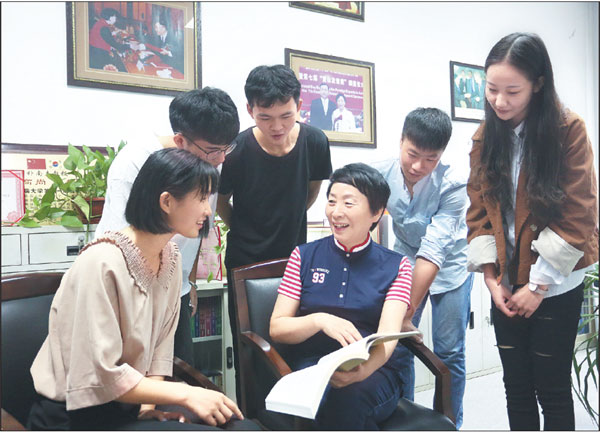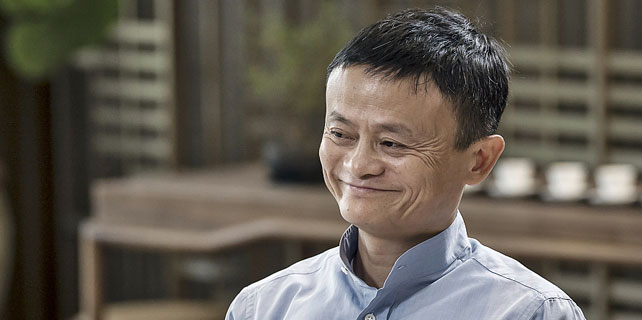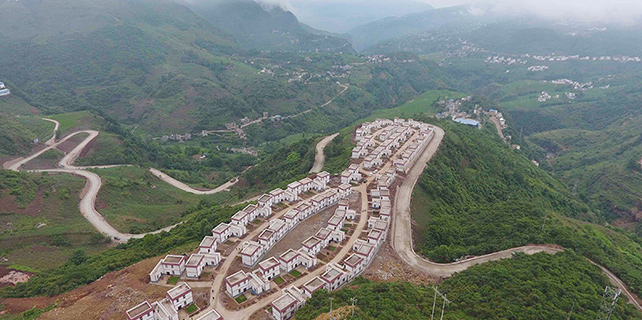A true friend of China
A remarkable South Korean teacher took up residence in Hefei, Anhui province, at the urging of her young son and never looked back. She has played a prominent role in education, business development and friendship.
Editor's Note: The Communist Party of China will hold its 19th National Congress on Oct 18. In the runup to the meeting, China Daily asked a prominent South Korean teacher to talk about her experiences in promoting educational improvements, business cooperation and people-to-people understanding in her native country and her adopted home.
Over the last 21 years, South Korean teacher Cho Sung-hye has contributed much to the friendship between the people of her country and China.
A teacher of Korean at Hefei University in Anhui province, Cho has helped to boost the two countries' ties in multiple aspects - not just in education.
In 2002, she became the first person from her country to receive China's Friendship Award, the highest honor given to foreigners by the central government. And she was the first South Korean citizen to gain permanent residency in China in 2006. In 2010, she was listed as one of the most influential women of the century in Hefei.
"My husband and I came to China - to Hefei - to fulfill my elder son's dream. We didn't expect that we would come to love the country as much as we do," said Cho, who speaks fluent Mandarin.
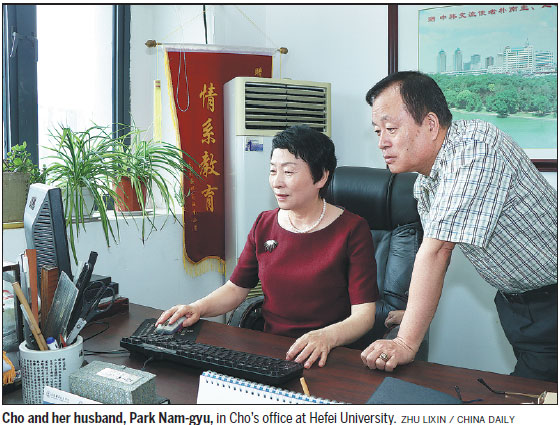
Cho was born in Seosan, South Korea. Before coming to China as an adult, she worked at Soon Chun Hyang University as a teacher.
"When the eldest of my two sons was in the third year of middle school, his history teacher, who had some experience in China, suggested the students go to live there and have a close look at the old country," Cho said.
The boy - a great fan of Chinese history who was able to give the names of more than 900 figures in the Chinese classic Romance of Three Kingdoms - was inspired and wanted very much to follow the suggestion.
"He wanted to go to the inland provinces, and he had some knowledge of Anhui, so he chose Hefei as his destination," Cho said. She herself knew little of the province or its capital at that time, so she decided to have a look before taking her family there.
"On the visit to Hefei, I found it was not very developed but thought it would have great potential. Dozens of universities are located here, including the University of Science and Technology of China, one of the country's best," she said.
Within a year, she moved to the city with her husband, Park Nam-gyu, and her sons. The couple found employment quickly at Hefei University and began teaching Korean the next year. The university was the first in the province to have such a course.
After finishing middle school and high school studies in the city, Cho's elder son was admitted to Peking University for undergraduate studies, and then returned to Hefei later for his MBA at the University of Science and Technology of China. The younger one attended Anhui University of Chinese Medicine and earned bachelor's and master's degrees there.
After about a year in Hefei, Park took a job in the United States and tried to persuade Cho to give up Hefei.
"I told him that we had just started here and we should at least spend five years in the city before judging whether we should move to another place," Cho said.
Half a year later, Park returned to Hefei University and has been there ever since.
Cho's brothers and sisters also brought their children to Hefei. "At the peak, I had 21 relatives living here, and there are still 12 of them now," Cho said.
Impressed by how the history teacher had influenced her son, Cho has encouraged Chinese students to go to South Korea. She has helped more than 3,000 students from Anhui to study in her country, and more than 1,000 were given job opportunities there. And she has brought even more students from South Korea to China.
To better promote the educational exchanges, Cho and her husband founded the Handa Cultural Exchange Co in Hefei in 2006, with Cho as president. Her son is general manager.
In 1998, when she was back in her hometown, Cho delivered a three-hour speech to 82 heads of primary schools, trying to persuade them to offer Chinese courses.
"China is developing very fast and will play more important roles in the world. The two countries must promote cooperation in many areas, but how can cooperation go well if our next generation doesn't understand Chinese?" Cho asked.
In 2000, with Cho's help, the Banyang Elementary School - in which she had studied - began teaching Chinese. It was the first primary school in the country to do so.
"Nowadays all the primary schools in my country have made Chinese-language courses available to students," said Cho, who was believed by some local media to have given the strongest push to the achievement.
Cho's reputation is not limited to education, however. It also extends to boosting Sino-South Korean economic ties and helping the province's poverty-stricken areas.
She also serves as an economic counselor for the Hefei Economic and Technological Development Area, where Hefei University is based, and the Hefei High-Tech Industry Development Zone.
Some of the South Korean companies based in the two zones, the largest in the province, were attracted through Cho's efforts.
She is now helping the development area build a China-South Korea Industry Park, and she has already brought in three South Korean companies to invest in the city's high-tech zone.
"Now I often accompany Hefei officials to South Korea for business recruitment and students for educational exchanges," Cho said. "In the early years, transportation between Hefei and South Korea was not convenient. Travelers had to change flights in Shanghai or Nanjing, Jiangsu province.
"There were even South Korean businessmen who intended to invest in Hefei but decided to invest in Shanghai and Nanjing instead, as they found the two cities to be more developed," she added. "Nowadays, flights connecting Hefei with Incheon in South Korea are available five days a week, and the situation is improving."
Cho and her husband have also donated hundreds of thousands of yuan to help prevent the children of poverty-stricken rural families in Anhui from dropping out of school.
The latest example was a 2016 donation of 20,000 yuan ($3,000) to four high school graduates in Hefei's Feidong county who had been enrolled at universities but were about to give up for lack of money.
Cho said the number of the poverty-stricken students is declining, and they can now get more financial support from the government, rather than relying on occasional social donations.
"In the five years since the 18th CPC National Congress in 2012, China has invested more than ever before in poverty relief, and President Xi Jinping has vowed to eliminate poverty by 2020," Cho noted.
"In the past 21 years, I have witnessed great development achievements in China, and I believe the five years to come after the pending 19th CPC National Congress will bring the country a more prosperous future."
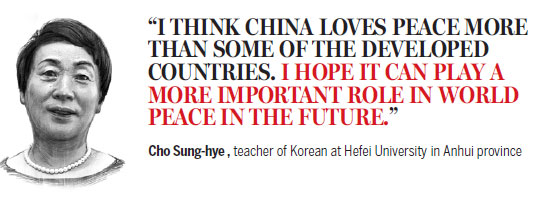
What do you feel has been China's biggest achievement over the past five years? What's the most notable change you've observed?
China has achieved much in many aspects over the last five years. One of the results is that the Chinese people are more confident than ever about their country's development.
The improvement of the people's confidence itself is one of the biggest achievements.
What three words would you use to describe China today?
Revitalizing, changing, confident.
What's the biggest challenge China faces, and how do you think the country should go about overcoming it?
The biggest challenge could come from the changes. First, China is playing an increasingly important role in the world, so some neighboring countries, and especially some developed Western countries may regard China as a challenger to the power they have maintained for many years. How to make the other countries believe a rapidly developing China is not a threat is really a tough issue.
I think China should attract even more foreigners, because from my own experience, having a look at the real China, not just the view from overseas, makes a big difference. More policies should also be made to attract more foreign talent to work in China. Letting them work here can make better use of their contribution, and also working in a country can give the foreigners more opportunities to develop a more profound understanding of the country.
What are your expectations for the upcoming 19th National Congress of the Communist Party of China? What are the key issues you care about most?
I think China loves peace more than some of the developed countries. I hope it can play a more important role in world peace in the future.
What is your impression of President Xi Jinping?
I think he is a determined man. He has been trying his best to achieve what he has vowed to do. One of the examples is environmental protection. In the urban area of Hefei, there is a hill called Dashu Hill. When we were living in a community about 10 kilometers away, we could seldom see the hill from the window. For the last five years, the air has been clearing up. We now can see the hill from home in most days. President Xi puts a lot of emphasis on environmental protection. It's not what you say; it's what you do.
Also, Xi has been very good at choosing the right people to work with him. China is a big country, so officials have to collaborate with each other well.
Do you believe that some of China's experiences or practices could be used to solve pressing global problems? If so, what are they?
China has a very mature and comprehensive system to foster leadership. Officials should all start from basic positions and get promotions gradually. Before they became major officials, dozens of years should have passed and they should have collected enough experience to tackle seemingly tough problems.
I don't believe the Western countries' political practices could work in China, though many of them are considered successful by the Westerners themselves. Some of China's practices are also worth learning, such as how it trains its officials.
What do you think China will be like in five years' time? How do you view China's longer-term future?
Chinese people's incomes have increased significantly in recent years and they will become richer in the next five years. Opening up to the world has brought dramatic changes to the coastal regions, which have been more developed that the inland areas. I believe that in the coming five years, the gap between coastal and inland regions will be narrowed.
It's hard to make long-term predictions, but I hope China can keep its own development pace and have its own development patterns.
What's the most memorable experience you've had in China, or related to China?
Unforgettable experiences in China are many. I became the first South Korean person to receive the Chinese Central Government's Friendship Award in 2002 and the first from my country to get permanent residency in China in 2006.
I was one of the torchbearers for the Beijing Olympic Games torch relay in Hefei in 2008. It was unforgettable because my family watched the relay in South Korea in 1988 but didn't get the chance to participate.
In recent years, I have received numerous awards from the Chinese government. The awards and torch are precious to me.
zhulixin@chinadaily.com.cn
|
Cho Sung-hye talks with her students at Hefei University in Anhui province.Wang Xun / for China Daily |







